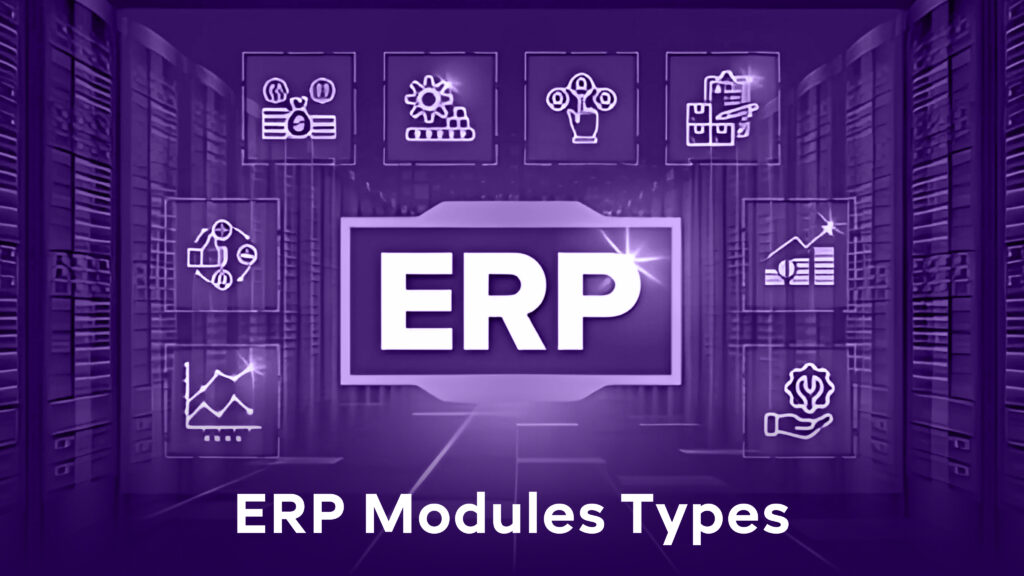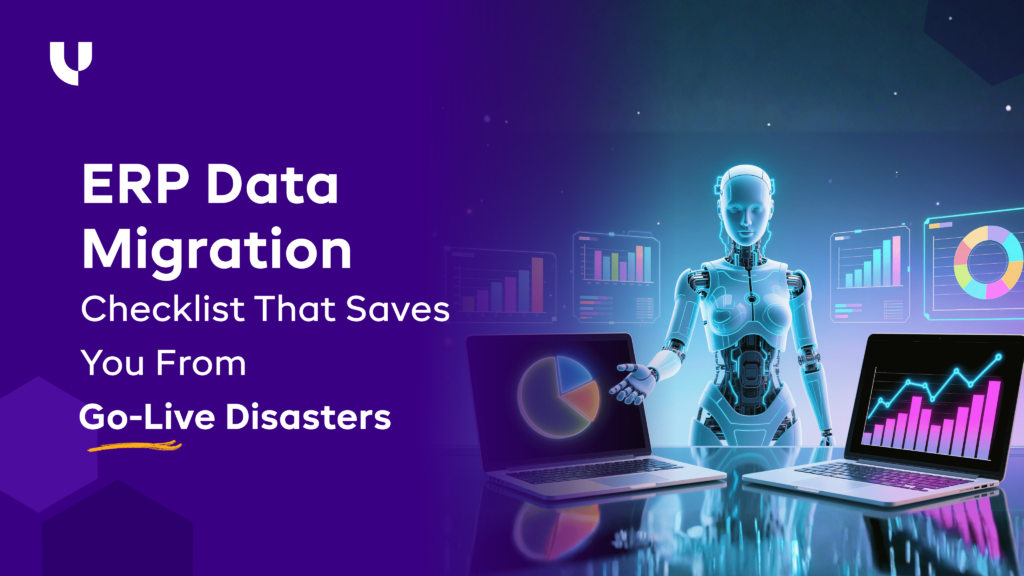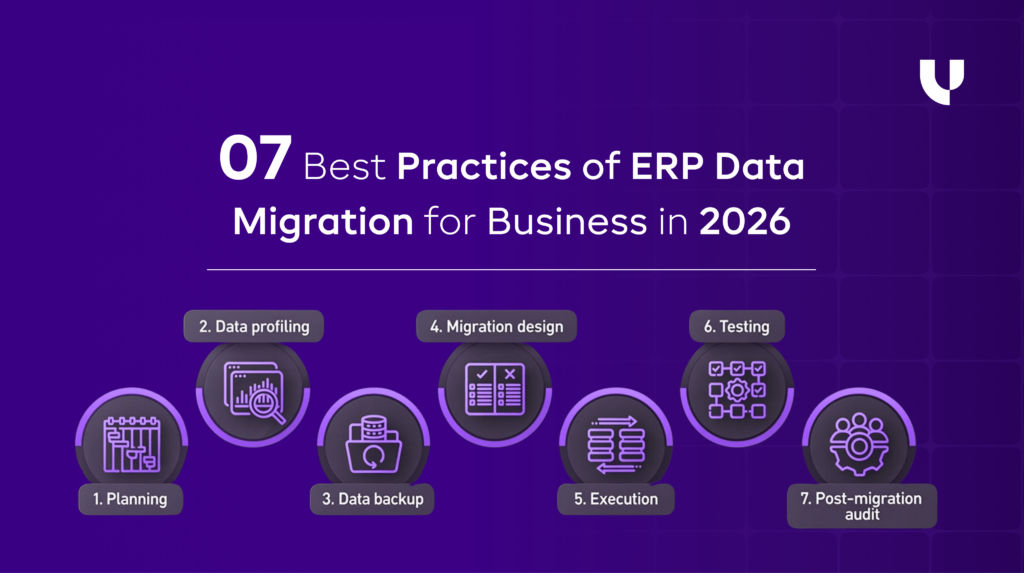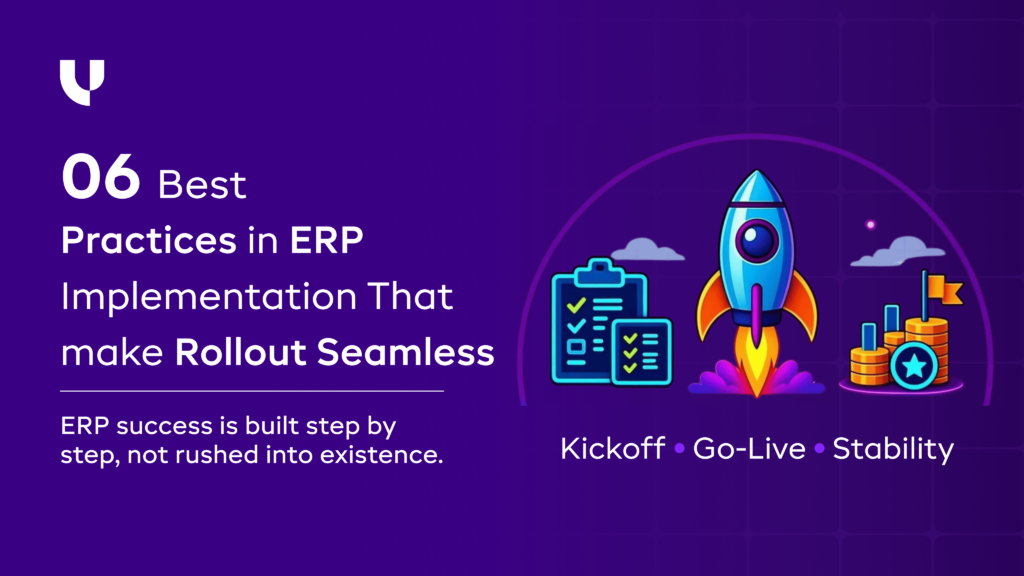The Complete Guide to ERP Modules: AI-Powered Insights for Modern Businesses
Published on January 4th 2023

Introduction
In today’s hyper-competitive business environment, efficiency and agility are no longer optional — they’re survival tools. Enterprise Resource Planning (ERP) systems have become the backbone of operations for companies of all sizes, enabling them to centralize data, automate processes, and make smarter decisions.ERP solutions are made up of modules — specialized components that handle different business functions, from finance and HR to supply chain and customer service. Each module can operate independently, but the real power comes when they work together, sharing data seamlessly.In this guide, we’ll explore the key ERP modules that modern businesses rely on, how AI is transforming their capabilities, and which ones might be the best fit for your organization. For a deeper dive into the process, check out the 9 ERP implementation phases to ensure business readiness.
What Are ERP Modules?
ERP modules are functional units within an ERP system that manage specific processes like finance, procurement, HR, and demand planning. Many modern ERPs, such as Odoo ERP, ranked among the best ERP software, also include CRM to create a connected, end-to-end system. By centralizing data, these modules reduce silos, cut manual work, and boost productivity.
10 Top ERP Modules and What They Do

Most ERP solutions begin with financials and then add extra capabilities, depending on your business priorities, your industry, and changing conditions. Here’s a list of the 10 top ERP modules, how they can help your organization, and why companies decide to use them.
1. Financial Management Module
At the heart of any ERP system lies the financial management module. It manages accounting, general ledger, accounts payable/receivable, budgeting, and asset tracking. Businesses often use solutions like Odoo Accounting to streamline these processes and ensure accurate financial reporting.Primary Functions
- Manage accounting, general ledger, accounts payable/receivable, budgeting, and asset tracking.
- Ensure accurate financial reporting and compliance.
Key Features
- The module automatically matches invoices to reduce reconciliation time.
- It uses predictive cash-flow forecasting to anticipate financial trends.
- Fraud detection alerts help identify and mitigate suspicious activities.
- Real-time dynamic budgeting allows quick adjustments to financial plans.
- Integration with other ERP modules ensures consolidated and accurate reporting.
Business Benefits
- Month-end closings are completed faster, saving valuable time.
- Automated processes reduce manual errors and lower fraud risks.
- Compliance accuracy improves through consistent and reliable reporting
- Enhanced financial visibility supports more informed decision-making.
- Enhanced financial visibility for better decision-making
2. Procurement / Purchasing Module
The procurement module streamlines everything from vendor selection to purchase order approvals. It’s designed to control costs, ensure timely supply, and improve vendor relationships.Primary Functions
- Streamline vendor selection, purchase order creation, and approvals.
- Maintain optimal supplier relationships while controlling costs.
Key Features
- Vendor performance analysis helps assess and select the most reliable suppliers.
- Price prediction and sourcing recommendations optimize purchasing decisions.
- Automated purchase requisitions and order tracking speed up the procurement cycle.
- Spend analysis and anomaly detection identify cost-saving opportunities and unusual spending patterns.
Business Benefits
- Procurement costs are reduced through better sourcing and process automation.
- Vendor performance and reliability improve with consistent monitoring and evaluation.
- Early detection of overspending or unusual purchases helps maintain budget control.
- Supply reliability is enhanced, ensuring the timely delivery of goods and materials.
3. Inventory & Warehouse Management Module
Inventory control is crucial for preventing stockouts and avoiding overstock. This module tracks quantities, locations, movements, and valuation of goods.Primary Functions
- Track stock quantities, locations, and movements.
- Prevent overstocking and stockouts.
Key Features
- AI-driven demand forecasting helps predict stock needs and plan inventory efficiently.
- Smart warehouse routing and picking optimization improve order-picking speed and accuracy.
- Real-time stock level visibility ensures quick updates on inventory status.
- Multi-location inventory control allows centralized management of stock across different warehouses.
Business Benefits
- Carrying costs are reduced by maintaining optimal inventory levels.
- Order fulfillment times are faster due to improved warehouse operations.
- The risk of stock shortages or excess inventory is minimized.
- Warehouse productivity increases through optimized processes and better resource use.
4. Supply Chain & Order Management Module
A robust supply chain management (SCM) module integrates procurement, production, logistics, and distribution. Order management ensures that customer orders are processed, fulfilled, and delivered efficiently.Primary Functions
- Manage procurement, production, logistics, and distribution workflows.
- Ensure smooth and timely order fulfillment.
Key Features
- Dynamic shipment re-routing allows adjustments to delivery plans based on real-time conditions.
- Delivery schedule optimization ensures timely and cost-efficient shipments.
- Real-time order tracking provides customers and teams with up-to-date order statuses.
- Disruption impact mitigation reduces delays and keeps supply chain operations running smoothly.
Business Benefits
- Delivery lead times are shortened through efficient planning and execution.
- The supply chain becomes more resilient to disruptions and unforeseen events.
- Logistics costs are reduced by optimizing transportation and routing.
- Customer satisfaction improves with faster and more reliable deliveries.
5. Customer Relationship Management (CRM) Module
The CRM module captures every customer interaction — from the first inquiry to after-sales support — and integrates it with sales, marketing, and service operations.Primary Functions
- Record and manage all customer interactions.
- Support sales, marketing, and customer service operations.
Key Features
- Predictive sales opportunity identification helps sales teams focus on the most promising leads.
- Customer retention risk alerts notify teams about clients at risk of churning.
- Personalized offer recommendations boost engagement and conversion rates.
- Integration with marketing campaigns and service records ensures a unified customer experience.
Business Benefits
- Sales increase through effective upselling and cross-selling strategies.
- Customer retention rates improve with timely interventions and targeted engagement.
- Data-backed insights strengthen customer relationships.
- Marketing ROI improves through better targeting and personalization.
6. Human Resource Management (HRM) Module
HR modules manage employee data, payroll, recruitment, benefits, and performance reviews.Primary Functions
- Manage employee records, payroll, recruitment, benefits, and evaluations.
- Support workforce planning and employee engagement through data-driven HR strategies.
Key Features
- Candidate-role matching AI tools help identify the best fit for open positions.
- Turnover risk prediction alerts HR teams about employees who may be at risk of leaving.
- Personalized career development planning supports employee growth and engagement.
- Integrated payroll and benefits management streamlines compensation and benefits administration.
Business Benefits
- Hiring decisions are faster and more accurate through AI-driven matching.
- Employee attrition is reduced with proactive retention strategies.
- Workforce productivity is enhanced by aligning roles, skills, and development plans.
- HR compliance and record-keeping improve with centralized, accurate data.
7. Manufacturing / Production Module
The manufacturing module, often paired with Material Requirements Planning (MRP), handles production scheduling, quality control, and resource allocation. Businesses leverage tools like Odoo Manufacturing Module to optimize workflows, improve product quality, and maximize resource utilization.Primary Functions
- Plan, schedule, and monitor production processes.
- Integrate shop-floor activities with material planning.
Key Features
- AI-driven production scheduling optimizes timelines and resource allocation.
- Scrap and waste reduction tools minimize material loss during production.
- Workload balancing across facilities ensures even distribution of tasks and efficiency.
- Quality control integration maintains consistent product standards throughout manufacturing.
Business Benefits
- Downtime and production delays are reduced through better scheduling.
- Manufacturing costs decrease due to optimized resource usage and reduced waste.
- Product quality improves with built-in quality control measures.
- Resource utilization is maximized, boosting overall operational efficiency.
8. Project Management Module
For service-oriented and engineering companies, project management is a critical ERP function. It tracks project timelines, budgets, resources, and deliverables.Primary Functions
- Track and manage project timelines, resources, budgets, and deliverables.
- Coordinate tasks and team collaboration to ensure projects stay on schedule and within scope.
Key Features
- Project risk prediction identifies potential issues before they impact delivery.
- AI-powered resource allocation ensures optimal use of available talent and tools.
- Real-time project dashboards provide up-to-date visibility into progress and performance.
- Budget monitoring and alerts help prevent overspending and keep projects on track.
Business Benefits
- Project overruns are reduced through proactive risk and budget management.
- Resources are used more efficiently, improving productivity and cost control.
- Project delivery success rates increase with better planning and execution.
- Stakeholders gain greater transparency through accurate, real-time reporting.
9. Marketing Automation Module
ERP-integrated marketing modules centralize campaign planning, execution, and performance tracking across channels.Primary Functions
- Manage and track marketing campaigns across multiple channels.
- Automate audience segmentation, targeting, and follow-up activities to improve campaign efficiency.
Key Features
- Advanced audience segmentation enables precise targeting of marketing messages.
- Campaign performance prediction helps forecast results and optimize strategies.
- Lead conversion probability scoring prioritizes prospects with the highest potential.
- Cross-channel campaign integration ensures consistency across all marketing platforms.
Business Benefits
- Marketing ROI increases through better targeting and performance optimization.
- Lead quality and conversion rates improve with data-driven prioritization.
- Manual marketing tasks are reduced through automation.
- Campaigns achieve better results with consistent, cross-channel execution.
10. Analytics, Risk, and Compliance Module
Data-driven decisions depend on accurate analytics. This module gathers information from all ERP areas for reporting, visualization, and compliance monitoring. Solutions like Odoo in the Hospitality & Tourism Industry help businesses in these sectors turn raw data into actionable insights, ensuring better operational efficiency and compliance.Primary Functions
- Collect and analyze ERP data for insights and reporting.
- Ensure regulatory compliance and risk management.
Key Features
- Anomaly detection in financial and operational data highlights irregularities for quick action.
- Automated compliance reporting ensures timely and accurate submissions to regulators.
- Risk exposure analysis and recommendations help businesses mitigate potential threats.
- Industry-specific analytics, such as for hospitality and tourism, deliver tailored insights for better performance.
Business Benefits
- Decision-making becomes faster and more accurate through real-time analytics.
- Compliance risks and potential penalties are reduced with automated monitoring.
- Businesses are better prepared for market changes with forward-looking risk analysis.
- Operational efficiency improves through data-driven process optimization.
ERP Module Comparison Table
| Module | Key Functionality | AI-Driven Capabilities |
|---|---|---|
| Financial Management | Accounting, AP/AR, budgeting, reporting | Predictive forecasting, fraud detection |
| Procurement | Vendor management, purchase orders, contracts | Vendor scoring, price prediction |
| Inventory & Warehouse | Stock tracking, WMS, valuation | Demand forecasting, smart warehouse routing |
| Supply Chain & Order Management | Logistics, fulfillment, distribution | Dynamic routing, disruption mitigation |
| CRM | Lead tracking, sales history, customer support | Churn prediction, personalized recommendations |
| HRM | Payroll, recruitment, performance reviews | Talent matching, attrition risk prediction |
| Manufacturing / MRP | Production scheduling, quality control | Resource optimization, downtime reduction |
| Project Management | Timelines, budgets, resource allocation | Risk forecasting, resource optimization |
| Marketing Automation | Campaign planning, execution, tracking | Audience segmentation, campaign performance prediction |
| Analytics & Compliance | Reporting, dashboards, audit tracking | Anomaly detection, automated compliance |
How to Choose the Right ERP Modules for Your Business
When selecting ERP modules, focus on aligning them with your business goals, industry needs, and future growth plans.
- Assess Your Business Needs – Identify pain points and processes that need automation or better control.
- Prioritize Core Functions – Start with essential modules like finance, HR, and inventory before adding specialized ones.
- Consider Industry Requirements – Choose modules tailored to your sector, such as manufacturing, healthcare, or retail.
- Evaluate Integration Capabilities – Ensure modules work seamlessly with existing tools and each other.
- Check for Scalability – Pick modules that can grow with your business.
- Involve Key Stakeholders – Get input from teams who will use the system daily.
- Test Before Committing – Use demos or trials to verify usability and fit.
Discover the Right ERP Modules for Your Business
From finance to HR, every module plays a role in your growth. Let’s find the perfect mix for you.
Talk to an ERP Expert
Ready to Choose the Right ERP Modules for Your Business?
Choosing the right ERP modules is key to aligning technology with your business goals. The right configuration can streamline workflows, provide actionable insights, and ensure every department works in harmony. At Uncanny, we specialize in Odoo ERP implementations tailored to your unique needs—practical, scalable, and built for growth. Ready to choose the right ERP modules for your business? Let’s make it simple.Talk to us today.
Frequently Asked Questions (FAQs) about ERP Modules & AI-Powered Insights
Q1: What are the most important ERP modules for a growing business?
The essential modules vary depending on your industry and goals, but common priorities include Financial Management, Inventory Management, Human Resource Management, and CRM. These modules provide the foundation for smooth operations, accurate reporting, and better decision-making.
Q2: How do I decide which ERP modules my company really needs?
Start by mapping your business processes and identifying bottlenecks. Then, focus on modules that directly address those gaps—whether that’s better inventory control, automated marketing, or stronger analytics. The goal is to align ERP capabilities with your business priorities.
Q3: Can I add new ERP modules later as my business grows?
Yes, most modern ERP systems are modular, meaning you can start with core modules and add more as your needs evolve. This approach helps control costs while ensuring your ERP system remains scalable.
Q4: Are industry-specific ERP modules worth it?
Absolutely. Industry-focused modules—like hospitality analytics, manufacturing control, or retail POS—are designed to handle sector-specific challenges and compliance requirements, making them more effective than generic tools.
Q5: How do integrated ERP modules help my business work better?
When ERP modules are integrated, data flows seamlessly across departments. This eliminates duplication, improves accuracy, and enables real-time insights, helping all teams work toward common goals.

About Author


